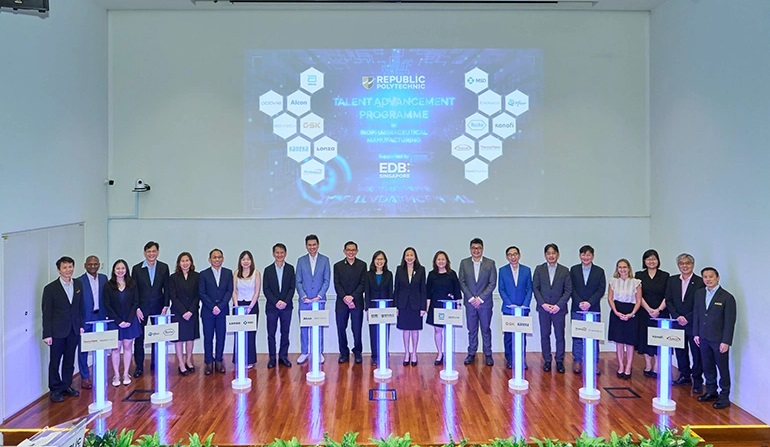
RP launched the Talent Advancement Programme (TAP), a first-of-its-kind initiative across local polytechnics designed to prepare students for the growing biopharmaceutical industry, in collaboration with the Biopharmaceutical Manufacturers Advisory Council (BMAC). The initiative was supported by the Singapore Economic Development Board (EDB).
The strategic partnership with the BMAC, comprising 16 globally leading biomedical sciences companies, ensures a sustainable pipeline of talent for this high-growth industry in Singapore. As a key feature, it will also offer students an extensive 36-week internship in their final year, providing unparalleled exposure to the inner workings of leading biopharmaceutical companies.
Through the TAP, students gain deeper expertise and practical experience aligned with the Biopharmaceutical Manufacturing Skills Framework. Further, the program provides students with a real-world understanding of global biopharmaceutical operations through multi-departmental rotations and industry-driven projects. Internships enhance skills in manufacturing, automation, engineering, and supply chain sectors.
Additionally, the collaboration will allow the educational experience to be tailored to the needs of the biopharmaceutical industry in serving the healthcare needs of patients nationwide. The program will be open to 360 students from the relevant science and engineering diplomas in Academic Year (AY) 2025. This will steadily increase to approximately 1,000 in AY 2027 when the curriculum revamp for about 9 diplomas is completed.
There are over 60 biopharmaceutical manufacturing facilities in Singapore across diverse modalities – from Active Pharmaceutical Ingredients (APIs) to Biologics (Therapeutics and Vaccines) and Cell Therapies. Eight out of the top 10 biopharmaceutical companies have best- in-class facilities here. These facilities produced S$18.7 billion worth of products in 2023, hiring more than 9,500 workers, contributing 1.5% to the nation's GDP.




